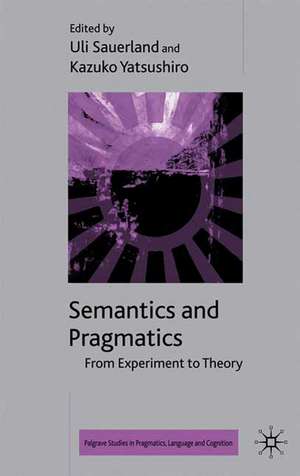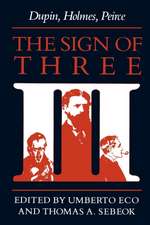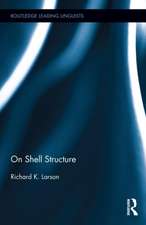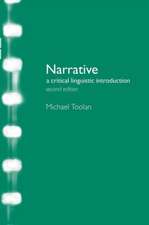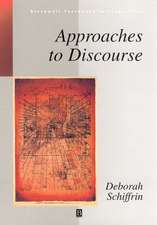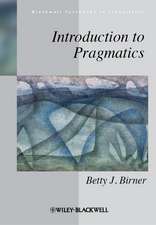Semantics and Pragmatics: From Experiment to Theory: Palgrave Studies in Pragmatics, Language and Cognition
Editat de R. Breheny, Uli Sauerland, Kenneth A. Loparoen Limba Engleză Hardback – 22 oct 2009
Din seria Palgrave Studies in Pragmatics, Language and Cognition
- 20%
 Preț: 755.73 lei
Preț: 755.73 lei - 15%
 Preț: 642.18 lei
Preț: 642.18 lei -
 Preț: 387.75 lei
Preț: 387.75 lei - 15%
 Preț: 641.53 lei
Preț: 641.53 lei -
 Preț: 387.75 lei
Preț: 387.75 lei -
 Preț: 390.63 lei
Preț: 390.63 lei -
 Preț: 386.39 lei
Preț: 386.39 lei -
 Preț: 393.52 lei
Preț: 393.52 lei -
 Preț: 396.40 lei
Preț: 396.40 lei - 15%
 Preț: 641.85 lei
Preț: 641.85 lei -
 Preț: 419.21 lei
Preț: 419.21 lei - 15%
 Preț: 640.88 lei
Preț: 640.88 lei -
 Preț: 385.47 lei
Preț: 385.47 lei -
 Preț: 386.81 lei
Preț: 386.81 lei - 15%
 Preț: 644.30 lei
Preț: 644.30 lei -
 Preț: 391.40 lei
Preț: 391.40 lei -
 Preț: 422.31 lei
Preț: 422.31 lei - 15%
 Preț: 701.90 lei
Preț: 701.90 lei -
 Preț: 453.39 lei
Preț: 453.39 lei - 18%
 Preț: 946.87 lei
Preț: 946.87 lei - 15%
 Preț: 643.00 lei
Preț: 643.00 lei -
 Preț: 387.58 lei
Preț: 387.58 lei -
 Preț: 394.51 lei
Preț: 394.51 lei -
 Preț: 393.52 lei
Preț: 393.52 lei
Preț: 644.18 lei
Preț vechi: 757.85 lei
-15% Nou
Puncte Express: 966
Preț estimativ în valută:
123.26€ • 129.04$ • 101.99£
123.26€ • 129.04$ • 101.99£
Carte tipărită la comandă
Livrare economică 07-21 aprilie
Preluare comenzi: 021 569.72.76
Specificații
ISBN-13: 9780230579064
ISBN-10: 023057906X
Pagini: 325
Ilustrații: XVI, 325 p.
Dimensiuni: 140 x 216 x 23 mm
Greutate: 0.52 kg
Ediția:2009
Editura: Palgrave Macmillan UK
Colecția Palgrave Macmillan
Seria Palgrave Studies in Pragmatics, Language and Cognition
Locul publicării:London, United Kingdom
ISBN-10: 023057906X
Pagini: 325
Ilustrații: XVI, 325 p.
Dimensiuni: 140 x 216 x 23 mm
Greutate: 0.52 kg
Ediția:2009
Editura: Palgrave Macmillan UK
Colecția Palgrave Macmillan
Seria Palgrave Studies in Pragmatics, Language and Cognition
Locul publicării:London, United Kingdom
Cuprins
Preface and Acknowledgements Notes on Contributors PART I: IMPLICATURE Implicatures; M.Krifka Changes in Activation Levels with Scalar Implicatures; L.Bott A Large-Scale Investigation of Scalar Implicature; P.Hendriks , J.Hoeks , H.De Hoop , I.Krämer , E-J.Smits , J.Spenader & H.De Swart Evaluating Under-Informative Utterances with Context-Dependent and Context-Independent Scales: Experimental and Theoretical Implications; N.Katsos Distinguishing the SAID from the IMPLICATED Using a Novel Experimental Paradigm; M.Larson , R.Doran , Y.Mcnabb , R.Baker , M.Berends , A.Djalali ,& G.Ward Experiments on QUD and Focus as a Contextual Constraint on Scalar Implicature Calculation; A.Zondervan PART II: NEGATION Meaning and Inference Linked to Negation: An Experimental Pragmatic Approach; I.A.Noveck The DE-Blocking Hypothesis: The Role of Grammar in Scalar Reasoning; A.Bezuidenhout , R.Morris & C.Widmann Experimental Pragmatics and Parsimony: The Case of Scopally Ambiguous Sentences Containing Negation; A.Gualmini How are Pragmatic Differences Between Positive and Negative Sentences Captured in the Processes and Representations in Language Comprehension; B.Kaup Brain Potentials For Logical-Semantics/-Pragmatics; J.E.Drury & K.Steinhauer PART III: PRESUPPOSITION Presupposition: From Theory to Experiment; U.Sauerland The Real-Time Use of Information about Common Ground in Restricting Domains of Reference; D.Heller , D.Grodner & M.K.Tanenhaus An Experimental Approach of Adverbial Modification; E.Chemla Weak Definite Noun Phrases: Rich, But Not Strong, Special, But Not Unique; N.M.Klein , W.M.Gegg-Harrison , R.S.Sussman , G.N.Carlson & M.K.Tanenhaus The Neuropragmatics of 'Simple' Utterance Comprehension an Erp Review; J.J.A.Van Berkum Index
Notă biografică
RACHEL BAKER, Department of Linguistics, Northwestern University, USAMATTHEW BERENDS, Department of Linguistics, Northwestern University, USAJOS J.A. VAN BERKUM, Max Planck Institute for Psycholinguistics, The NetherlandsANNE BEZUIDENHOUT, Department of Philosophy, University of South Carolina, USALEWIS BOTT, School of Psychology, Cardiff University, UKGREG N. CARLSON, Department of Linguistics, University of Rochester, USAEMMANUEL CHEMLA, Ecole Normale Supérieure, FranceALEX DJALALI, Department of Linguistics, Northwestern University, USARYAN DORNA, Department of Linguistics, Northwestern University, USAJOHN E. DRURY, School of Communication Sciences and Disorders, McGill University, CanadaWHITNEY M. GREGG-HARRISON, Department of Brain and Cognitive Sciences, University of Rochester, USADANIEL GRODNER, Department of Psychology, Swarthmore College, USAANDREA GUALMINI, Institute of Linguistics, Utrecht University, The NetherlandsDAPHNA HELLER, Department of Brain and Cognitive Sciences, University of Rochester, USAPETRA HENDRIKS, Rijksuniversiteit Groningen, The NetherlandsJOHN HOEKS, Rijksuniversiteit Groningen, The NetherlandsHELEN DE HOOP, Radboud Universiteit, The NetherlandsNAPOLEON KATSOS, Research Centre for English and Applied Linguistics, UKBARBARA KUAP, Department of Psychology, Berlin University of Technology, GermanyNATALIE M. KLEIN, Department of Brain and Cognitive Sciences, University of Rochester, USAIRENE KRÄMER,Radboud Universiteit, The NetherlandsMANFRED KRIFKA, Institut für deutsche Sprache und Linguistik, Humboldt-Universität zu Berlin, GermanyMEREDITH LARSON, Department of Linguistics, Northwestern University, USAYARON McNABB, Department of Linguistics, University of Chicago, USAROBIN MORRIS, Department of Philosophy, University of South Carolina, USAIRA A. NOVEK, L2C2/Institut des Sciences Cognitives, FranceERIK-JAN SMITS, Rijksuniversiteit Groningen, The NetherlandsJENNIFER SPENADER, Rijksuniversiteit Groningen, The NetherlandsKARSTEN STEINHAUER, School of Communication Sciences and Disorders, McGill University, CanadaRACHEL S. SUSSMAN, Department of Psychology, University of Wisconsin, USAHENRIËTTE DE SWART, Utrecht Institute of Linguistics OTS, The NetherlandsMICHAEL K. TANENHAUS, Department of Brain and Cognitive Sciences, University of Rochester, USACINTIA WIDMANN, Department of Linguistics, University of South Carolina, USAGREGORY WARD, Department of Linguistics, Northwestern University, USAARJEN ZONDERVAN, Utrecht Institute of Linguistics OTS, The Netherlands
